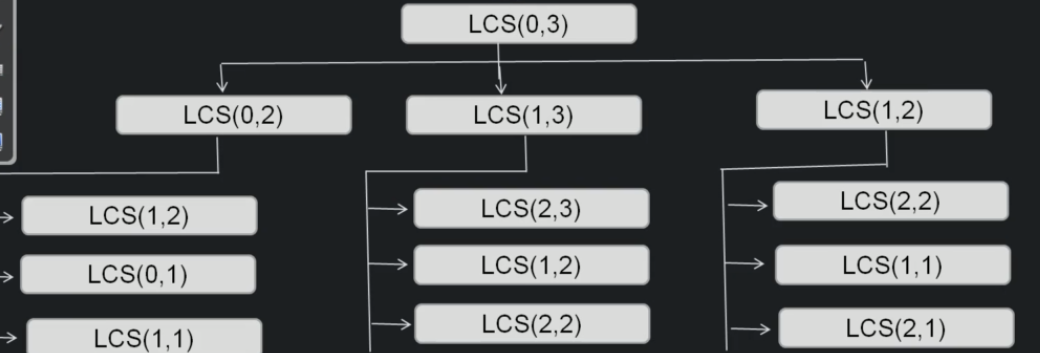Longest Palindromic subsequence
int LPSAux( String st, int startIndex, int endIndex )
if startIndex > endIndex // dont need to traverse more than 1/2 of the string
return 0
if startIndex == endIndex // there is only 1 character
return 1
int count1 = 0
if st.charAt(startIndex == st.charAt(endIndex))
count1 = 2+ LPSAux(st, startIndex + 1, endIndex - 1)
int count2 = LPSAux(st, startIndex + 1, endIndex)
int count3 = LPSAUx(st, startIndex, endIndex - 1)
return Max(count1, count2, count3)

Top Down approach
int lps_Aux(int[][] dp, String string, int startIndex, int endIndex)
if startIndex > endIndex
return 0
if startIndex == endIndex
return 1
if(dp[startIndex][endIndex] == null)
int c3 = 0
if string.charAt(startIndex) == string.charAt(endIndex)
c3 = 2 + lps_Aux(dp, string, startIndex + 1, endIndex -1)
int c1 = lps_Aux(dp, string, startIndex + 1, endIndex)
int c1 = lps_Aux(dp, string, startIndex, endIndex - 1)
dp[startIndex][endIndex] = Math.max(c1,c2,c3)
return dp[startIndex][endIndex]
Bottom up approach
int findLPSLength(String st)
int[][] dp = new int[st.length][st.length]
for int col = 0; col < st.length; col++
for int row = st.length; row >= 0; row--
if row > col
dp[row][col] = 0
else if row == col
dp[row][col] = 1
else
if st.charAt(row) == st.charAt(col)
dp[row][col] == Math.max(
2+dp[row+1][col-1],
dp[row][col-1],
dp[row+1][col]
)
else
dp[row][col] = Math.max(dp[row][col-1], dp[row+1][col])
return dp[0][st.length-1]
